We all know the standard-issue demon, all horns and sulfur and dark seduction, often done up in a bespoke suit; perhaps you’d care to trade your soul for this totally sweet vintage Jaguar, or maybe you prefer to play chess? Of all the recurring characters in Western literature, the devil and his attendant demons rank among the most familiar. If we’re talking Paradise Lost, or Faust, or the many works that bear their imprint, the devil’s evil is complicated by a rebellious grandeur, a defiance both poignant and brave in its futility. But whether his wickedness is crude or nuanced, the devil walks cloaked in tropes.
But the devil is a shapeshifter, and what we find if we lift away that cloak depends on the imaginations of those who dare to interrogate the nature of the demonic. Writers who conjure up the devil on their pages have encountered fiends both coldly alien and far too human for comfort. They’ve revealed versions of Mephistopheles who offer a hideous reflection of the culture in which they’ve appeared, who expose something about the specific forms evil takes in the modern world. But they’ve also described demons who are quirky or wistful or even oddly innocent as they create their casual havoc; demons who, like human beings, are engaged in a constant struggle with their own will to destruction. Here are five of my favorite books featuring out-of-the-ordinary denizens of Hell.
The Master and Margarita by Mikhail Bulgakov
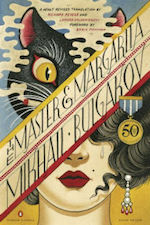 No survey of the demonic in literature is complete without Mikhail Bulgakov’s satirical masterpiece, in which the devil and a band of spirited demons visit Soviet Moscow. Bulgakov’s Professor Woland has something of the sly suavity of the classic man-of-wealth-and-taste, but with a confounding eccentricity punctuated by bursts of oddball enthusiasm. But it’s his supporting cast that really shines, from the eerie assassin Azazello to the delightful imp Behemoth, an immense and impudent black cat who, in one memorable scene, swings from a chandelier while blasting away at the secret police with a gun.
No survey of the demonic in literature is complete without Mikhail Bulgakov’s satirical masterpiece, in which the devil and a band of spirited demons visit Soviet Moscow. Bulgakov’s Professor Woland has something of the sly suavity of the classic man-of-wealth-and-taste, but with a confounding eccentricity punctuated by bursts of oddball enthusiasm. But it’s his supporting cast that really shines, from the eerie assassin Azazello to the delightful imp Behemoth, an immense and impudent black cat who, in one memorable scene, swings from a chandelier while blasting away at the secret police with a gun.
Beyond Black by Hilary Mantel
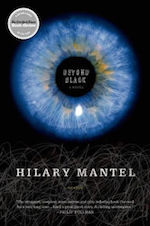 Mantel, best known for her Thomas Cromwell trilogy, is also one of the greatest chroniclers of the demonic going. Her earlier, devastating novel of a horribly traumatized, but quite authentic, psychic creates jet-black humor out of unspeakable horror. Mantel’s Alison Hart is plagued by the ghosts of her abusers, a chipper flock of grotesque spirits who discuss child-rape and sandwiches with precisely the same vapid bonhomie. The suggestion that Morris and his friends have, ah, graduated from being mere ghosts into something more hellish comes from the way that they answer to “old Nick.” “Nick he is a fambly man,” the ghouls explain, and Satan himself might cut very close to home.
Mantel, best known for her Thomas Cromwell trilogy, is also one of the greatest chroniclers of the demonic going. Her earlier, devastating novel of a horribly traumatized, but quite authentic, psychic creates jet-black humor out of unspeakable horror. Mantel’s Alison Hart is plagued by the ghosts of her abusers, a chipper flock of grotesque spirits who discuss child-rape and sandwiches with precisely the same vapid bonhomie. The suggestion that Morris and his friends have, ah, graduated from being mere ghosts into something more hellish comes from the way that they answer to “old Nick.” “Nick he is a fambly man,” the ghouls explain, and Satan himself might cut very close to home.
Blood Meridian by Cormac McCarthy
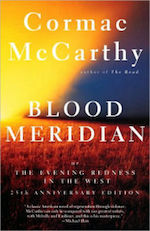 McCarthy’s nightmare Western follows a band of sadistic marauders as they inflict atrocities on anyone in their path. But even these psychopaths, who festoon trees with dead babies, live in awe-struck dread of their leader, the judge, who can overhear the slightest whisper of dissent with “ears like a fox.” The judge spouts a morose and hellish philosophy as his men enter, all too eagerly, into the creation of an Inferno on earth. It’s the following exchange, though, that reveals the judge’s true identity:
McCarthy’s nightmare Western follows a band of sadistic marauders as they inflict atrocities on anyone in their path. But even these psychopaths, who festoon trees with dead babies, live in awe-struck dread of their leader, the judge, who can overhear the slightest whisper of dissent with “ears like a fox.” The judge spouts a morose and hellish philosophy as his men enter, all too eagerly, into the creation of an Inferno on earth. It’s the following exchange, though, that reveals the judge’s true identity:
The freedom of birds is an insult to me. I’d have them all in zoos.
That would be a hell of a zoo.
The judge smiled. Yes, he said. Even so.
Snake Agent by Liz Williams
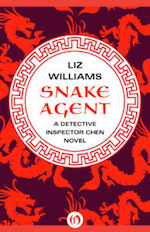 Williams’s Inspector Chen investigates crimes with a supernatural bent, and his work entangles him with a colorful assortment of demons, who, despite their bureaucratic protocols and email accounts, remain recognizably Boschian. The standout here is Chen’s infernal beloved Inari, a rather sweet, agoraphobic demon on the lam from an arranged marriage in hell. Inari aspires to an idealized human decency, but she still can’t resist deploying the occasional flippant curse, or reflexively exploiting the man she loves. Her impish sidekick, who shape-shifts between badger and teakettle, ranks among the cutest of literary hellspawn.
Williams’s Inspector Chen investigates crimes with a supernatural bent, and his work entangles him with a colorful assortment of demons, who, despite their bureaucratic protocols and email accounts, remain recognizably Boschian. The standout here is Chen’s infernal beloved Inari, a rather sweet, agoraphobic demon on the lam from an arranged marriage in hell. Inari aspires to an idealized human decency, but she still can’t resist deploying the occasional flippant curse, or reflexively exploiting the man she loves. Her impish sidekick, who shape-shifts between badger and teakettle, ranks among the cutest of literary hellspawn.
Kafka on the Shore by Haruki Murakami
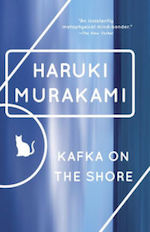 While widely appreciated as one of Murakami’s greatest novels, Kafka on the Shore is oddly neglected in discussions of the demonic in literature. But Murakami’s devil strikes me as capturing something essential that other books have missed: evil’s distinctive blending of buffoonery and sadism. A devil who fetishizes capitalist icons, and who manifests in the forms of Colonel Sanders and Johnnie Walker, might seem ludicrous—if only he weren’t engaged in the terrifying project of making a magic flute from the souls of tortured cats. The fact that he also has a human identity as the sculptor Koichi Tamura and father of the hero, Kafka Tamura, shows how readily human evil can shade into something truly demonic. The kingdom of Hell is among us.
While widely appreciated as one of Murakami’s greatest novels, Kafka on the Shore is oddly neglected in discussions of the demonic in literature. But Murakami’s devil strikes me as capturing something essential that other books have missed: evil’s distinctive blending of buffoonery and sadism. A devil who fetishizes capitalist icons, and who manifests in the forms of Colonel Sanders and Johnnie Walker, might seem ludicrous—if only he weren’t engaged in the terrifying project of making a magic flute from the souls of tortured cats. The fact that he also has a human identity as the sculptor Koichi Tamura and father of the hero, Kafka Tamura, shows how readily human evil can shade into something truly demonic. The kingdom of Hell is among us.
Top image: Fantasia (1940)
 Sarah Porter is a writer, artist, and freelance teacher who lives in Brooklyn with her husband and two cats. She is the author of several books for young adults, including Vassa in the Night, soon to be published by Tor Teen.
Sarah Porter is a writer, artist, and freelance teacher who lives in Brooklyn with her husband and two cats. She is the author of several books for young adults, including Vassa in the Night, soon to be published by Tor Teen.










“Falling Angel” by William Hjortsberg.
I kind of like the “demons” in Correia’s Grimnoir Chronicles. Especially when a villain summoned one and then possessed it, using its demonic form to try and kill the heroes.
Terry Pratchett’s “Good Omens”
Jonathan Stroud’s Bartimaeus books.
Aahz, (no relation) from the Myth series was first to mind.
My favourite demon is Harry in ‘Old Harry’s Game’ a BBC 4 radio show written by, and featuring as Harry, Andy Hamilton.
Seconding Good Omens, with its unusual demons and even more unusual Antichrist.
The Lone Power in the Young Wizards series by Diane Duane is Satan in all but name, but It has a variety of interesting manifestations and a delightfully unusual plot arc (note: I’ve only read the first 5 books).
This isn’t a book per se but a play which is also sold in book form so there we go. I offer, Conor McPherson’s The Seafarer as having a very unconventional Satan, called Mr. Lockhart here. The play revolves around a card game played on Christmas Eve with four Irish drunkards and Satan in disguise. Three of the four men think they’re just playing for fun but another, Sharkey, knows the stakes are far higher. Satan and Sharkey are playing for Sharkey’s soul! This devil seemingly feels just like a genteel, well dressed, well heeled gentleman (dressed to the nines while the other three are in casual clothes through the play) who drinks, swears, gambles, philosophizes about death and Hell. But because the stakes are not so high, one man’s soul compared to usually world-shaking stakes in other depictions of the Evil One, this feels different. A More intimate Satan. The play opened in 2006 in London and moved to Broadway in 2007. Ron Cook originated the Mr. Lockhart role in London but when the play moved to Broadway, Ciaran Hinds (Yes, Mance Rayder/ Aberforth Dumbledore/ Caesar/ Captain Wentworth etc.) took over the role, some say brilliantly. It has been revived on several occasions in larger and smaller venues since.
Memoirs of a Master Forger by William Heaney (the late lamented Graham Joyce).
The US publication was under Joyce’s own name, and with the insipid title How to Make Friends with Demons. (Tor.com review)
I’m not generally a YA fan, but Bartimaeus totally won me over. Gotta read that prequel book sometime.
Seconding the nomination of Beyond Black. That’s a brilliant, and brilliantly horrifying book. (I never got around to suggesting it for the “Horror Novels Not Shelved as Horror” thread, but it fits there too.)
On a much lighter note, I’m fond of Desdemona, the multiple-accreted-personality titular demon of Lois McMaster Bujold’s Penric’s Demon.
Fred Saberhagen’s Empire of the East had the most original demons, created in the midst of a nuclear war, they were the exploding nuclear weapons at a given moment in time, given life.
Echoing the love for the Master and Margarita, Old Harry’s Game, Good Omens, and the Bartimaeus books, which makes me think I need to read the other recommendations here. I just wanted to put in a word for Matthew Hughes’ The Damned Busters.
Pandemonium by Daryl Gregory.
An ex-demon I remember with some fondness: Rick Smith’s Shuck the Sulfurstar, an old god who’s been Hell’s Faustian soul-purchaser (among other mythological roles), and is trying to distance himself from a past he’s not proud of anymore. It was a sweet Herrimanish comicbook series, and I’m hoping it sees print again some day.
Spanky by Christopher Fowler
I, Lucifer: Finally, The Other Side of The Story by Glenn Duncan
Satan, His Psychotherapy and Cure by The Unfortunate Dr. Kassler, JSPS by Jeremy Leven
The Reluctant Devil by Miranda Seymour
God’s Demon by Wayne Barlowe
Shout-out for the Hunter’s Kiss novels by Marjorie M Liu. The heroine has three demons which live on/in her skin as tattoes and offer her [mostly] protection and advice.
I quote:
The Hunter Kiss series is about the last living demon hunter on earth — a woman covered in living tattoos that peel off her body at night to form her own personal demonic army — an army that is her only family, dedicated to saving her life — and destined to end it.
http://marjoriemliu.com/novels/
Tad Williams’ Bobby Dollar series features some pretty incredible demons.
I’ve always been partial to The Screwtape Letters by C.S. Lewis – an offbeat satire of human lives as seen through the eyes of two demons, told through letters to each other. Although a satire, it is also poignant at times as it deals with many themes, such as loss, temptation, lust, etc.
Blood Meridian is still on my TBR. Lot of folks dug it. I thought The Road was pretty great.